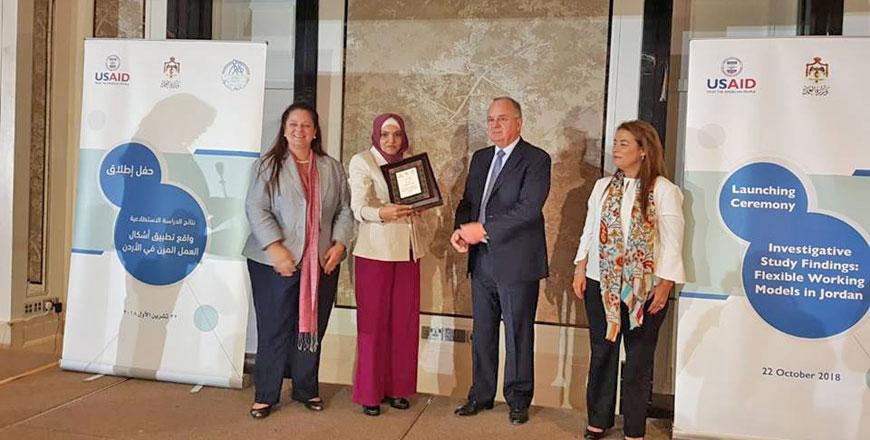You are here
Companies implementing flexible working hours more productive — report
By Ana V. Ibáñez Prieto - Oct 25,2018 - Last updated at Oct 25,2018

Minister of Labour Samir Murad on Monday released findings of a study on flexible working models which showed that most companies applying the system in the Kingdom are more productive than those sticking to traditional work schedules ( Photo courtesy of the Ministry of Labour)
AMMAN — Minister of Labour Samir Murad on Monday disclosed the findings of a study on flexible working models in Jordan, which showed that most companies applying the system in the Kingdom are more productive than those sticking to traditional work schedules.
The assessment, carried out by the Labour Ministry in cooperation with the Higher Population Council (HPC) and USAID, found that 95 per cent of the organisations with over 50 workers that applied the system “showed positive effects as a result of its implementation”.
In addition, 60 per cent of the organisations indicated that the application of flexible working hours contributed to an increase in the employment of women and their continued stay in the company, while workers experienced more satisfaction with their jobs.
In terms of awareness, the study showed that 75 per cent of the assessed organisations were aware of the flexible working hours system, while 35 per cent had developed policies and procedures for the system.
During the launching ceremony, HPC Secretary General Abla Amawi, noted that “the application of flexible work in various institutions is one of the most important policies that the council is currently working on”, stressing the need to create a proper environment for women at work for the achievement of economic and social goals.
USAID acting mission director, Nancy Eslick, pointed out that the flexible working hours system is “the most family-sensitive policy in the workplace”, providing means for both genders to achieve greater balance between family and professional duties.
“Flexible working hours and their proper application will increase the participation of women in the labour market and prevent their early withdrawal,” Murad noted, stressing that the application of the system does not reduce productivity rates.
Building on the results of the study, Murad called on all representatives of the private sector to adopt the system, noting that its application will attract the high competencies and skills of more Jordanian men and women who would otherwise hesitate to work.
The minister also pointed out that the study was an outcome of a cooperation agreement signed in April with the HPC and USAID, which aimed at boosting the participation of women in the labour market through the proper implementation of flexible work arrangements.
During the signing ceremony, Murad stressed that “the flexible working hours system comes as a joint effort exerted by the national committee formed by the Ministry of Labour and its strategic partners".
The agreement followed the endorsement of the Cabinet’s decision on the flexible working hours by-law for 2017 by Royal Decree, which sought to increase the economic participation of various segments of society by opening up “new and innovative” opportunities in the workplace.
Workers who have been in their jobs for three consecutive years, workers with family responsibilities, university students and workers with disabilities were expected to benefit from the by-law, according to an infographic published by the prime minister’s office.
Elaborating on the Royal Decree, Murad pointed out that “this system mainly serves working women, and it is an achievement”, explaining that the agreement came in line with the 2018 Flexible Work Instructions issued under Article 13 of the Flexible Labour Law No. 22 of 2017.
The proper implementation of flexible working hours was one of the main issues addressed in the recommendations submitted to Parliament in February this year by a coalition of 11 organisations focused on the achievement of a more gender-sensitive Labour Law.
Ahmad Awad, director of the Jordan Labour Watch and member of the coalition, told The Jordan Times that “it is still too early to reach real results in terms of economic participation”, cautioning that “the system does not provide enough tools for its proper implementation”.
“The flexible working hours system issued in March last year was distorted and incomplete, leaving the final decision to apply it for the employers alone,” the expert said, noting that the regulations did not include a specific quota to grant workers the right to benefit from the system when the conditions apply.
International Labour Organisation Gender Consultant Reem Aslan told The Jordan Times that "flexible work arrangements are an achievement for Jordan, as they will allow persons with family responsibilities — and especially women — to remain in the workforce without any career interruption".
However, the expert added that “it is also important for the Jordanian government to consider giving incentives to employers that provide such work environments — especially since the study shows the limited number that have internal documented policies for flexi-work”.
“We also need to make sure that employees who opt to choose the option of part-time jobs are fully aware of the financial implications it has on the long term, as it will not only affect their income, but will also affect their pension,” she said.
Related Articles
AMMAN — The Ministry of Labour and the Higher Population Council (HPC) on Thursday signed a cooperation agreement with USAID, aimed at boost
AMMAN — Labour Minister Samir Murad on Monday said that a national committee chaired by the minister and strategic partners conducted a stud
AMMAN — The Social Security Law must be reviewed in order to match the flexible working hours by-law of 2017 according to a report iss
















